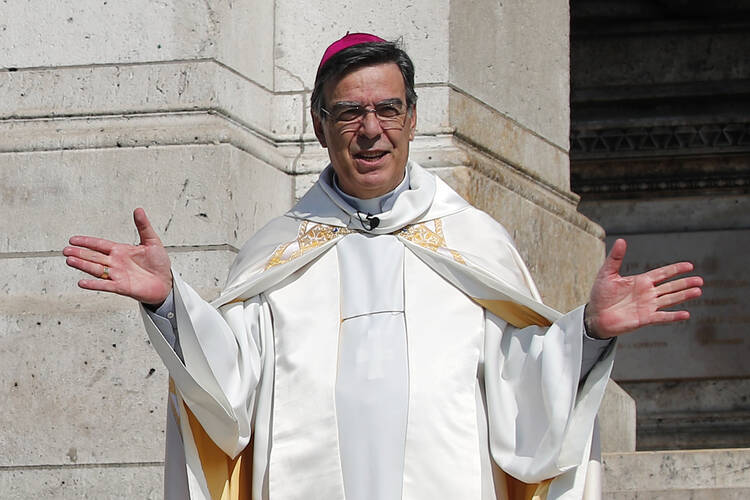PARIS (AP) — Pope Francis has accepted the resignation of Archbishop Michel Aupetit of Paris, who had offered to step down to avoid “becoming a source of divisions,” after an article in the Le Point weekly claimed he mismanaged his archdiocese and had an affair with a woman while he was vicar general.
The pope also named retired Archbishop Georges Pontier to temporarily lead the archdiocese as the apostolic administrator; the 78-year-old archbishop had served as apostolic administrator of the Archdiocese of Avignon from January to July after deep divisions and financial difficulties lead to the early retirement of Archbishop Jean-Pierre Marie Cattenoz.
The Vatican made the announcement Dec. 2.
Archbishop Aupetit, 70, had told France’s Catholic La Croix daily Nov. 26 he had submitted his resignation to the pope and awaited his answer, adding that his behavior toward the unnamed woman “may have been ambiguous,” but had not extended to “an intimate relationship and sexual relations.”
Archbishop Michel Aupetit: “I recognize, as I have said before, that I poorly handled the situation with a person who was in contact many times with me.”
Aupetit denied being the author of the email and told Le Point that he didn't have intimate and sexual relations with the woman.
Roman Catholic prelates take vows of chastity. At the time of the alleged relationship, Aupetit was a priest in the archdiocese of Paris; he was made an auxiliary bishop of Paris in 2013 and was installed as Paris archbishop in January 2018.
In an interview Friday with Catholic radio Notre Dame, Aupetit denounced the “virulent” Le Point article.
“Those who knew me at the time and who shared my daily life would certainly tell that I was not living a double life, as the article suggests,” he said. “I recognize, as I have said before, that I poorly handled the situation with a person who was in contact many times with me.”
Archbishop Michel Aupetit, 70, said that his behavior toward the unnamed woman “may have been ambiguous,” but had not extended to “an intimate relationship and sexual relations.”
Calling it a “mistake,” he said he decided not to see the woman any more after speaking with Cardinal André Vingt-Trois, the then-Paris archbishop, at the beginning of 2012.
In comments to La Croix newspaper published Friday, Aupetit said that he did not use the word “resignation” in his letter to Francis, which he said would mean that he was “abandoning” his function. He said he instead put the decision in the hands of the pope.
He is the latest Catholic bishop to do so. The former archbishop of Lyon, Cardinal Philippe Barbarin, offered to resign in 2019 after a French court convicted him of failing to report a pedophile priest. Francis refused to accept the resignation pending the outcome of Barbarin’s appeal, though he accepted it the following year, by which time Barbarin had been acquitted.
More recently, German Cardinal Reinhard Marx, the archbishop of Munich and Freising, offered to resign over the Catholic Church’s “catastrophic” mishandling of clergy sexual abuse cases.
Francis refused to accept it and Marx remains in office.
Only the pope can hire or fire bishops, or accept their resignations. At 70, Aupetit is five years shy of the normal retirement age for bishops.
This article has been updated.








